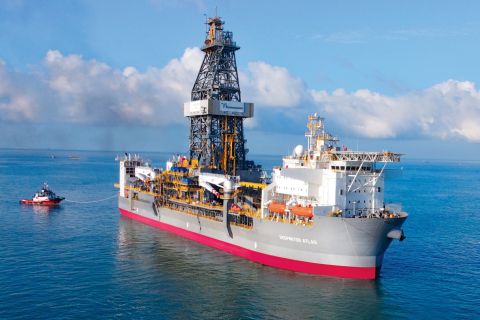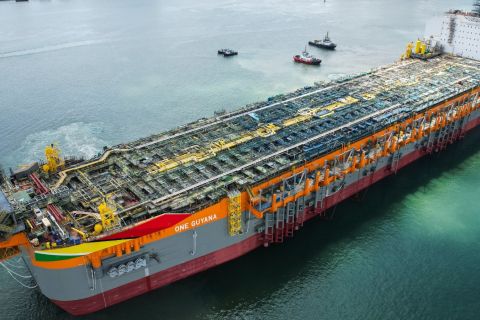Ten companies on Oct. 10 agreed to pay more than $2 billion for E&P rights in 12 offshore oil blocks in Brazil, in what could be a promising sign for even bigger upcoming oil auctions.
The most heavily sought-after areas in the auction directly border Brazil’s so-called presalt area, a zone in which billions of barrels of oil are trapped under a thick layer of salt beneath the ocean floor.
Presalt blocks will be up for grabs in two much larger auctions scheduled for Nov. 6 and Nov. 7, including the so-called transfer-of-rights auction, which is expected to fetch about $25 billion for the government.
On Oct. 10, companies agreed to pay the Brazilian government 8.9 billion reais (US$2.2 billion) in signing bonuses. Twenty-four blocks, many in more marginal oil-producing areas, failed to attract a bidder and will be placed in a new program the Brazilian government calls “permanent offer.”
The biggest move came from France’s Total SA, which, in a consortium with Malaysia’s Petronas and Qatar Petroleum, dropped 4.029 billion reais for one coveted block abutting the presalt area. Total will be the operator, with a 40% stake. Those areas, known as “fringe blocks,” are believed to share some geology with the presalt area.
After the auction, Mines and Energy Minister Bento Albuquerque said the results were “well above expectations,” pointing out that minimum signing bonus for all areas together combined was just 3.2 billion reais.
Other significant winning bids included a bid of 1.116 billion reais by Petronas for a block in the Campos Basin, and a 2.045 billion reais bid from Brazil’s Petrobras and BP Plc for a separate block.
Petronas made another significant move into Brazil in April, when it purchased two oilfields from state-run Petrobras for $1.29 billion.
Royal Dutch Shell Plc, Wintershall Dea GmbH, Chevron Corp., Exxon Mobil Corp. and Repsol SA also won at least minority stakes in exploration blocks.
It was not all positive news for the oil industry, however.
Seven blocks near the ecologically sensitive Abrolhos archipelago in northeastern Brazil received no bids, after environmental litigation involving federal prosecutors was disclosed on Oct. 9.
Recommended Reading
E&P Highlights: April 15, 2024
2024-04-15 - Here’s a roundup of the latest E&P headlines, including an ultra-deepwater discovery and new contract awards.
E&P Highlights: April 22, 2024
2024-04-22 - Here’s a roundup of the latest E&P headlines, including a standardization MoU and new contract awards.
Rystad: More Deepwater Wells to be Drilled in 2024
2024-02-29 - Upstream majors dive into deeper and frontier waters while exploration budgets for 2024 remain flat.
Deepwater Roundup 2024: Americas
2024-04-23 - The final part of Hart Energy E&P’s Deepwater Roundup focuses on projects coming online in the Americas from 2023 until the end of the decade.
Oceaneering Won $200MM in Manufactured Products Contracts in Q4 2023
2024-02-05 - The revenues from Oceaneering International’s manufactured products contracts range in value from less than $10 million to greater than $100 million.





